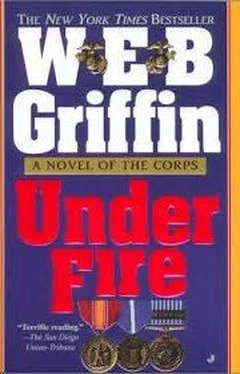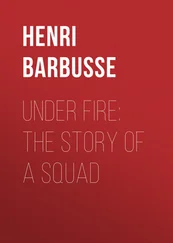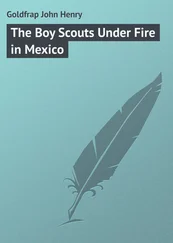Griffin W.E.B. - The Corps 09 - Under Fire
Здесь есть возможность читать онлайн «Griffin W.E.B. - The Corps 09 - Under Fire» весь текст электронной книги совершенно бесплатно (целиком полную версию без сокращений). В некоторых случаях можно слушать аудио, скачать через торрент в формате fb2 и присутствует краткое содержание. Год выпуска: 0101, Жанр: Старинная литература, на английском языке. Описание произведения, (предисловие) а так же отзывы посетителей доступны на портале библиотеки ЛибКат.
- Название:The Corps 09 - Under Fire
- Автор:
- Жанр:
- Год:0101
- ISBN:нет данных
- Рейтинг книги:5 / 5. Голосов: 1
-
Избранное:Добавить в избранное
- Отзывы:
-
Ваша оценка:
- 100
- 1
- 2
- 3
- 4
- 5
The Corps 09 - Under Fire: краткое содержание, описание и аннотация
Предлагаем к чтению аннотацию, описание, краткое содержание или предисловие (зависит от того, что написал сам автор книги «The Corps 09 - Under Fire»). Если вы не нашли необходимую информацию о книге — напишите в комментариях, мы постараемся отыскать её.
The Corps 09 - Under Fire — читать онлайн бесплатно полную книгу (весь текст) целиком
Ниже представлен текст книги, разбитый по страницам. Система сохранения места последней прочитанной страницы, позволяет с удобством читать онлайн бесплатно книгу «The Corps 09 - Under Fire», без необходимости каждый раз заново искать на чём Вы остановились. Поставьте закладку, и сможете в любой момент перейти на страницу, на которой закончили чтение.
Интервал:
Закладка:
"They're a team," Pickering said.
"... will be en route to the Flying Fish Channel islands, and, since we have no means of communicating with them, until they reach the islands-and maybe not then-it will be too late to call the operation off."
Chapter Thirteen
[ONE]
HEADQUARTERS, 1ST MARINE BRIGADE (PROVISIONAL)
NEAR CHINDONG-NI, SOUTH KOREA
1505 4 AUGUST 1950
The helicopter pad at Brigade Headquarters consisted of a flat area more or less paved with bricks, brick-size stones and gravel, and a windsock mounted on what looked like two tent poles lashed together.
Ten Marines, five enlisted men-a sergeant major and four Jeep drivers, ranging from private to buck sergeant- and five officers-a lieutenant colonel, a major, two cap-tains, and one master gunner-stood to one side and watched as the HO3S-1 helicopter made its approach and fluttered to the ground.
U.S. Marine Corps HO3S-1, tail number 142, was one of four Sikorsky helicopters that had been quickly de-tached from HMX-1 (H for Helicopter; X for Experimental) at Quantico, Virginia, and assigned to the 1st Marine Brigade's observation squadron, VMO-6, when the brigade was ordered to Korea. VMO-6 had four other aircraft, Piper Cub-type fixed-wing aircraft called OY-2 by the Marine Corps, and L-4 by the Army.
The HO3S-1 was manufactured by the Sikorsky Aircraft Corporation, and had in fact been designed by Igor Sikor-sky, a Russian refugee from communism himself. Sikorsky had also earlier designed the-then huge-Sikorsky Fly-ing Boats, which had permitted the first intercontinental passenger travel.
The HO3S-1 was powered by a nine-cylinder, 450-horsepower radial Pratt and Whitney engine. It had a three-blade main rotor, which turned in a 48-foot arc. It could lift just over 1,500 pounds (fuel, cargo, and up to three passen-gers, plus pilot, in any combination) and fly that much weight at up to 102 miles per hour in ideal conditions for about 250 miles.
For the first time, commanders had a means to move lit-erally anywhere on the battlefield at 100 miles per hour. Brigadier General Edward A. Craig, who had begun to use the helicopters the moment they had arrived in Korea, later said that without the helicopters he doubted they "would have had the success we did" in Korea.
Three of the five officers awaiting the helicopter were members of General Edward A. Craig's staff. The lieu-tenant colonel was his G-3, the major his G-2, and one of the captains his aide-de-camp. The second captain and the master gunner were not.
Aside from the briefing Captain McCoy had given the assembled officers on the attack transport the day they ar-rived in Pusan, the S-3 had never seen him before, and frankly doubted the sergeant major's belief that the clean-cut young officer was the legendary "Killer" McCoy who had single-handedly stabbed twenty Japanese to death in Shanghai, or some such bullshit. For one thing, he didn't look old enough, and for another, he didn't believe the story about twenty stabbed-to-death Japanese.
What he thought was that McCoy was an intelligence officer with an exaggerated opinion of his own importance and his role in the Marine Corps scheme of things.
Marine captains customarily answer any question lieu-tenant colonels put to them. When he had asked Captain Mc-Coy why he wished to see the general, McCoy had-politely, to be sure-told him that he was not at liberty to discuss that.
The S-3, the aide-de-camp, and the sergeant major, all of whom considered it part of their duties to protect the general from wasting his time dealing with people who could have their problems solved by somebody else, were all privately hoping that General Craig would emerge from his helicop-ter, learn that Captain McCoy had demanded to know when he would return to the CP, and eat him a new asshole.
Everyone more or less came to attention when the door of the helicopter opened and General Craig got out. The G-3 and Captain McCoy saluted.
"Reporting for duty, McCoy?" Craig asked, as he re-turned the salute.
"No, sir. I need a few minutes of your time."
"I have very little of that," Craig said. "What do you need?"
"Sir, I have to speak to you privately."
"Okay, let's go to the CP," he said.
"Sir," the S-3 said, "there're several things..."
"First, McCoy gets three minutes, Okay?"
"Aye, aye, sir."
The Jeeps made a little convoy as they drove to the com-mand post, a rather spartan sandbag-reinforced collection of tents set up against a steep incline. Bringing up the rear was a Jeep whose bumper markings identified it as belong-ing to the signal company of the Army's 24th Division. It held Captain McCoy and Master Gunner Zimmerman, who was driving.
General Craig's "office" was a chair and a desk, on which sat two field telephones in the interior of one of the tents. With his sergeant major, the G-3, the G-2, his aide, his sergeant major and McCoy and Zimmerman on his heels, he walked to it.
General Craig mimed wanting coffee to one of the clerks, who said, "Aye, aye, sir," and went to the stainless-steel pitcher sitting on an electric burner on the dirt floor.
"Okay, McCoy," General Craig said. "I interpret `a few minutes' to mean no more than three. Then you can get yourself a cup of coffee."
"Sir, I must speak to you privately."
"Captain, Colonel Fuster is my G-3. He has all the secu-rity clearances he needs."
"With respect, sir, he doesn't," McCoy said.
Craig looked at him coldly for a moment. "This had better be important, Captain," Craig said, then, to the G-3, "Give us three minutes, please, Colonel."
Lieutenant Colonel Fuster said, "Aye, aye, sir," and ges-tured to the G-2, the aide, and the sergeant major to leave the general's "office."
"Okay," Craig said. "What's on your mind?"
"Sir, I need a dozen men, noncoms, staff sergeants, and weapons and ammunition. Zimmerman has a list."
"Not that I have either men, weapons, or ammo to spare, but what for?"
"A clandestine operation, sir."
"Simple answer, no," Craig said. "Sorry."
"Sir, I was instructed to show you this, by General Pick-ering, as his authority to conduct the operation."
He took the White House orders from his utilities pocket and handed them to General Craig. Craig read them and handed them back.
"Am I permitted to know the nature of this clandestine operation?"
"Yes, sir. But General Pickering directed me to tell you, sir, that this is classified Top Secret/White House, and is not to be divulged to anyone."
"Understood," Craig said.
"There are two NK-occupied islands in the Flying Fish Channel leading to Inchon, sir, from which artillery could be brought to bear on vessels attempting to reach Inchon. We intend to occupy them now, using South Korean na-tional police."
"I thought they called that invasion operation off-Op-eration Bluehearts was what they called it-when we lost Taejon," Craig said. "Now it's back on?"
"I don't know if that operation is back on, sir, but Gen-eral Pickering thinks there will be an amphibious operation at Inchon."
"And you and a dozen noncoms are going to-invade is the wrong word; a dozen men can't invade anything-infil-trate these islands and secure them?"
"Yes, sir."
"Won't that tip the North Koreans that we're going to land at Inchon?"
"We hope they will believe it is a South Korean national police operation, sir. What I'm going to do with the non-coms is train and arm South Koreans-"
"South Koreans already on the islands?"
"Yes, sir. And I understand there's a lot of refugees from the mainland on the islands, too."
"What makes you think they'll volunteer?"
"When the North Koreans took Seoul and Inchon, they shot a lot of people they thought might cause trouble. The refugees want to pay them back."
Читать дальшеИнтервал:
Закладка:
Похожие книги на «The Corps 09 - Under Fire»
Представляем Вашему вниманию похожие книги на «The Corps 09 - Under Fire» списком для выбора. Мы отобрали схожую по названию и смыслу литературу в надежде предоставить читателям больше вариантов отыскать новые, интересные, ещё непрочитанные произведения.
Обсуждение, отзывы о книге «The Corps 09 - Under Fire» и просто собственные мнения читателей. Оставьте ваши комментарии, напишите, что Вы думаете о произведении, его смысле или главных героях. Укажите что конкретно понравилось, а что нет, и почему Вы так считаете.










